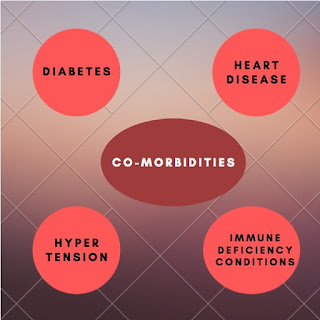The Co-morbidity Factor
The Co-morbidity Factor
"Co-morbidity" is a term which has gained a lot of focus the last couple of months. A lot of us were living with it without knowing this term and in recent months, this has become the scapegoat for a lot of things!
People with "it" are required to take special care of their health, they are requested to avoid areas of infection etc.. Even the govt is requesting people with co-morbidities to avoid stepping out unnecessarily.
Lets look at what it means and what you can do about it.
Co-morbidity is the simultaneous coexistence of multiple disorders alongside a primary disorder. The term comorbidity was first coined by Alvan R. Feinstein, a researcher at Yale University in a research paper published in 1970.
While these conditions are usually manageable with regular medicines and appropriate medical attention, the development of another infection puts a patient at increased risk. In healthy adults, the body’s immune system is able to develop antibodies that fight off viral infections. However, if you take the case of a patient with already existing conditions like diabetes or heart disease, the immune system’s response is compromised.
For e.g, when people with diabetes develop a viral infection, it is often difficult to treat them due to fluctuations in their blood glucose levels and the presence of diabetes complications. Their immune system is compromised. Similarly, people who have a stent implanted in their arteries may be more vulnerable to respiratory infection, as their blood vessels are already weakened.
So what can you do if you have been diagnosed with a lifestyle disorder?
Factors to reduce co-morbidity risk:
1. Exercise
Exercise plays a very important role in the management of most diseases. Take time to exercise and be active on a regular basis. It could be a daily walk for 30 mins or yoga or jogging or simple stretches. The aim here is not weight loss, but fitness. Regular exercise can keep your blood sugars correct, aid in fat burning and keep your lungs functioning properly. Many fitness activities can be pursued alone like yoga, cycling, walking etc. Start slow and keep it going.
2. Sleep
While this may not seem so important, lack of sleep can lead to serious issues like weight gain, reduced immunity or diminished cognitive abilities. It is important to get deep good quality sleep everyday. Weekend sleep cannot make up for daily late nights and sooner or later, it will take a toll on your health.
There could be a number of people with a hidden lifestyle issue taking no care of their nutrition because they are still young or they don't have any issues or because of ignorance.
Make sure your every meal is colourful - 2+ servings of vegetables per meal. Every meal should have protein, fibre and good fats. We need to start looking at food in terms of its nutritional value rather than taste.
In the end I would like to urge each and everyone to start investing in your health. It makes sense to know how the right nutrition can help your body. It is easier to prevent diseases rather than living with them. Take the right steps towards health.
Contact the Author
3. Nutrition
This goes without saying, but the number of people who ignore this is very high. Would you put water or kerosene in your vehicle and expect it to perform? It is the same way with our bodies - we need protein, fat, carbs, vitamins, minerals, fibre and water everyday. Not some days..but every single day. People with existing lifestyle diseases actually take care of their health better because their alarm bells have gone off.There could be a number of people with a hidden lifestyle issue taking no care of their nutrition because they are still young or they don't have any issues or because of ignorance.
Make sure your every meal is colourful - 2+ servings of vegetables per meal. Every meal should have protein, fibre and good fats. We need to start looking at food in terms of its nutritional value rather than taste.
4. Weight
Obesity is the disease associated with a host of comorbidities like type2 diabetes, heart risk, liver disease, cancer, fertility issues etc...Keep your weight in check as you work with your disease. Even a small reduction in weight can help you manage most diseases very well. That is because you are taking years off your biological age when you reduce weight the right way with fat loss.5. Stress
Stress is again a silent door opener to many issues. While it is almost impossible to keep away from stress, there are a number of ways to manage it effectively. Meditation, Pranayama, Laughter, Hobbies, Pets - there are umpteen ways to bring it down. It is important to acknowledge that stress levels are higher for people with existing conditions and take steps daily to relax the mind.6. Medications
Don't ignore your medications if you have any lifestyle issue. It is important to follow the doctor's orders regarding medicines and diet as you try to work your way to manage the disease.7. Supplements
When the body is coping with an issue like diabetes or hypothyroid, there are a lot of underlying conditions which leave you deficient in certain essential nutrients. For e.g. a lot of elderly people have B12 deficiency or people with thyroid issues may have an iron deficiency. It makes sense to supplement with good quality organic supplements where necessary.In the end I would like to urge each and everyone to start investing in your health. It makes sense to know how the right nutrition can help your body. It is easier to prevent diseases rather than living with them. Take the right steps towards health.
Contact the Author





Comments
Post a Comment